
-With AAP.
1. The body of missing NSW woman, Cecilia Devine, has been found in a Blue Mountains dam.
Human remains discovered in a Blue Mountains dam have been identified as those of 42-year-old Cecilia Devine, who had been missing for almost eight months.
Police are treating the discovery of the remains as a homicide and have launched Strike Force Eking to investigate.
Devine, previously known as Kristen Pearson, had been reported missing from Waratah, near Newcastle, on September 5, 2018, after her family and friends could not locate or contact her.
At the time, police said they had grave concerns for her welfare.
A police statement said remains were discovered at a water treatment facility in Katoomba on March 18, The Sydney Morning Herald reported.
After the discovery in March, police said the body had been there for “quite some time”.
In CCTV footage released by police on Wednesday, Devine can be seen leaving a hotel on Katoomba Street, Katoomba, on September 6, the day after she was reported missing.
She was wearing a yellow cardigan, black pants and carrying an orange handbag.
The day before, Devine was seen leaving a home on Turton Road, Waratah, before reported sightings in Hornsby and the Blue Mountains.
On December 21, on what would have been Devine’s 42nd birthday, police launched a public appeal to locate her.
Police and Devine’s family will have another public appeal for information on Wednesday.



Top Comments
Re Milat. The news said they rushed him to a hospital. Why on earth did they ‘rush’ they should have taken their time and with a bit of luck he might have died. Who cares.
I daresay it was just editorial hyperbole. It sounds like an elective procedure; he wouldn't have been "rushed" in any way.